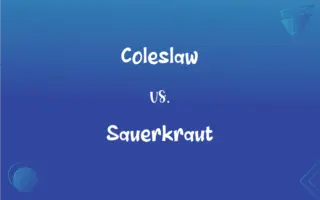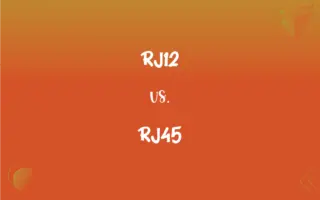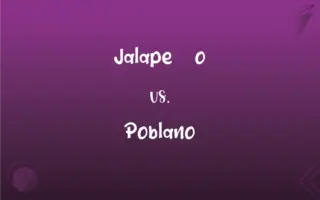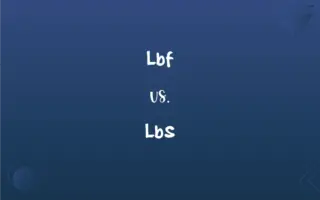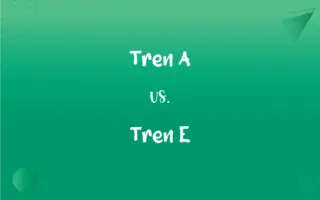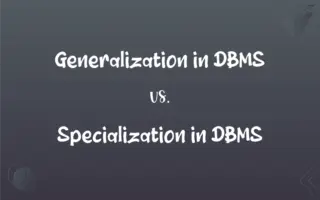Unix vs. Linux: What's the Difference?
Edited by Janet White || By Harlon Moss || Updated on October 16, 2023
Unix is a proprietary operating system developed in the 1970s, while Linux is an open-source OS inspired by Unix, created in the 1990s.
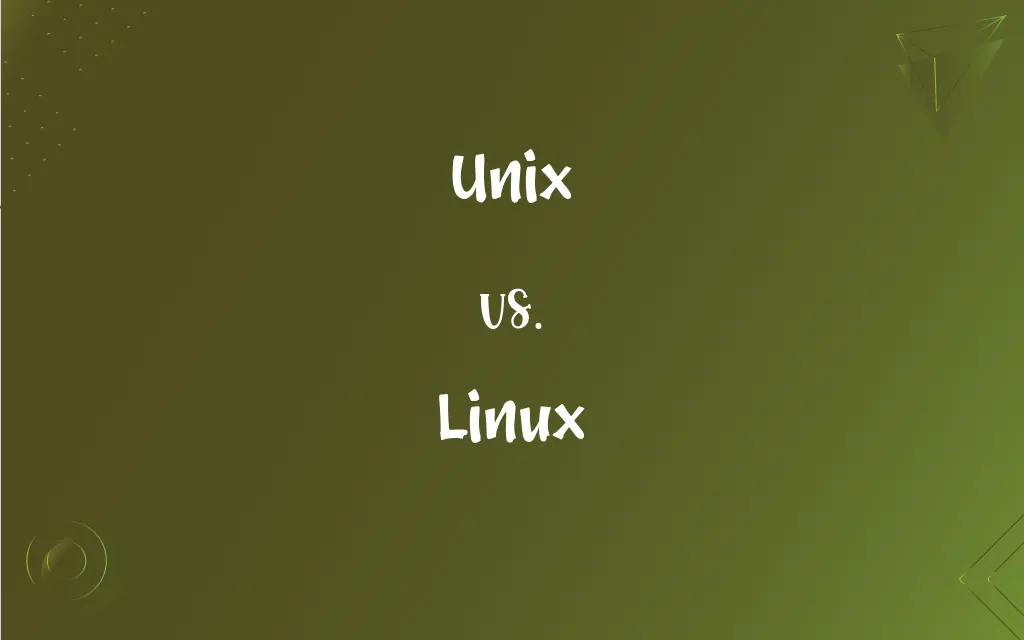
Key Differences
Unix originated in the late 1960s and was developed at AT&T's Bell Labs. This operating system was written in assembly language until 1973, when it was re-written in the C programming language. Linux, on the other hand, came into existence in the early 1990s and was developed by Linus Torvalds. While it draws inspiration from Unix, Linux is an independent operating system.
Unix is proprietary in nature, with various versions licensed to different companies over time. These versions have led to multiple Unix-based operating systems, each with its unique features and characteristics. Linux, conversely, is open-source, meaning its source code is freely available. This openness has led to countless Linux distributions, customized and developed by various communities and organizations.
In terms of user interfaces, Unix typically provides a command-line interface, although graphical user interfaces have been developed for several Unix versions. Linux offers both command-line and graphical interfaces, with many popular distributions having robust graphical environments.
From a licensing and cost perspective, Unix often comes with licensing fees, given its proprietary nature. Some Unix versions can be expensive, especially for commercial use. Linux, being open-source, is typically free, although some enterprise distributions may come with subscription costs for added services and support.
Lastly, while both Unix and Linux are powerful and robust operating systems, Linux's open-source nature has led to a larger and more active community. This community constantly contributes to the OS's development, making Linux highly adaptable and innovative compared to the more standardized Unix.
ADVERTISEMENT
Comparison Chart
Origin & Development
Developed in 1960s at AT&T's Bell Labs.
Developed in 1990s by Linus Torvalds.
Nature
Proprietary.
Open-source.
Versions/Distributions
Multiple proprietary versions.
Numerous free distributions.
Interface
Command-line (with some GUI versions).
Both command-line and graphical interfaces.
Cost & Licensing
Often licensed with fees.
Mostly free, some distributions have costs.
ADVERTISEMENT
Unix and Linux Definitions
Unix
A platform that has given rise to multiple derivatives, including AIX, HP-UX, and Solaris.
Sun Microsystems developed Solaris as their version of Unix.
Linux
An operating system known for its adaptability and community-driven development.
The Linux community actively contributes to its continual improvement.
Unix
An OS predominantly command-line based, with some versions having graphical interfaces.
Learning the Unix command line can be challenging but rewarding.
Linux
A versatile OS with numerous distributions like Ubuntu, Fedora, and CentOS.
Ubuntu is one of the most popular Linux distributions for desktops.
Unix
A proprietary operating system developed at AT&T's Bell Labs in the 1960s.
AT&T originally designed Unix for internal use.
Linux
An OS that's central to the open-source movement, promoting collaboration and freedom.
Linux has been pivotal in democratizing software development.
Unix
An operating system known for its stability and multitasking capabilities.
Many large enterprises trust Unix for their critical applications.
Linux
An open-source operating system inspired by Unix, developed by Linus Torvalds.
Linus Torvalds released the first version of Linux in 1991.
Unix
An influential OS that has inspired numerous other operating systems, including Linux.
Unix's principles have shaped the world of operating systems.
Linux
A platform that powers a vast majority of web servers and supercomputers worldwide.
Google, Facebook, and Amazon run their servers on Linux.
Unix
(software) Any Unix-like operating system, including Unix.
Linux
(software) Any unix-like operating system that uses the Linux kernel.
Unix
(software) Collectively, Unix and unix-like operating systems.
Linux
An open-source version of the UNIX operating system
Unix
Trademark for a powerful operating system
FAQs
Are Unix and Linux the same thing?
No, but Linux was inspired by Unix.
When was Unix developed?
In the late 1960s at AT&T's Bell Labs.
How does Linux's performance compare to Unix?
Both are robust and efficient, but performance can vary based on specific distributions or Unix versions.
Is Unix open-source?
No, it's proprietary.
What are some popular Linux distributions?
Ubuntu, Fedora, Debian, and CentOS, to name a few.
Is Linux suitable for desktop use?
Yes, many distributions are designed for desktop use.
Which companies have their versions of Unix?
IBM (AIX), HP (HP-UX), and Oracle (Solaris) are a few.
Can I contribute to Linux development?
Absolutely, it's open-source and community-driven.
Can I use Unix for free?
Generally, no, as it often requires licensing fees.
Can I run Unix applications on Linux?
Often, yes, with some compatibility layers or modifications.
Why is Linux popular for servers?
Due to its stability, security, and open-source nature.
Are there GUIs for Unix?
Yes, though historically it's command-line based, some versions offer GUIs.
What programming language was Unix originally written in?
Assembly, but it was later re-written in C.
What's the shell in Unix and Linux?
It's a user interface, either command-line or graphical, for accessing OS features.
Can I install Linux alongside Windows?
Yes, this is commonly referred to as a dual boot setup.
Who is the creator of Linux?
Linus Torvalds.
Which devices use Linux?
Everything from desktops and servers to smartphones (like Android) and IoT devices.
What's the primary license for Linux?
The GNU General Public License (GPL).
How often are new Linux distributions released?
Varies, but many popular distributions have annual or biannual releases.
Is MacOS based on Unix?
Yes, MacOS is based on a Unix derivative called Darwin.
About Author
Written by
Harlon MossHarlon is a seasoned quality moderator and accomplished content writer for Difference Wiki. An alumnus of the prestigious University of California, he earned his degree in Computer Science. Leveraging his academic background, Harlon brings a meticulous and informed perspective to his work, ensuring content accuracy and excellence.
Edited by
Janet WhiteJanet White has been an esteemed writer and blogger for Difference Wiki. Holding a Master's degree in Science and Medical Journalism from the prestigious Boston University, she has consistently demonstrated her expertise and passion for her field. When she's not immersed in her work, Janet relishes her time exercising, delving into a good book, and cherishing moments with friends and family.














































